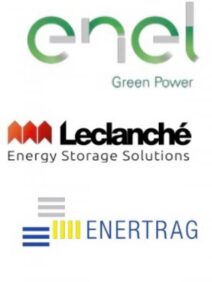A 22MW lithium-ion energy storage system has been inaugurated in Germany by a European consortium.
Italy’s Enel Green Power (EGP), German renewables company Enertrag and Swiss battery maker Leclanché launched the €17 million (US$19m) BESS at Cremzow, 102km northeast of Berlin, on 16 May.
The facility will provide frequency regulation services to Germany’s primary control reserve (PCR) market.
The BESS is owned by an entity in which EGP Germany holds a 90% majority stake and Enertrag the remaining 10%. Leclanché acts as the engineering, procurement and construction contractor for the project, in charge of integrating battery and power conversion systems and energy management software.
Enertrag CEO Jörg Müller said: “Cremzow BESS allows us to back up the renewable energy system in case a black start is necessary. Our consortium demonstrates that battery energy systems are profitable without subsidies. Renewable energy systems are mature.”
When the grid’s frequency decreases due to high power demand, the Cremzow BESS is able to deliver its stored energy within 30 seconds, while in response to frequency increases due to low demand, the battery is charged with the surplus energy.
Meanwhile, the project’s partners are studying the possibility of integrating the system to use surplus energy generated by Enertrag’s wind farms to charge the batteries while “avoiding curtailments”.
The introduction of battery storage systems is an important development in the German PCR market. In 2017, battery storage systems provided about 200MW of PCR, equal to about 31% of the market, according to the Cremzow BESS consortium.
A second large-scale lead-carbon BESS was put into operation in Germany earlier this month by the country’s Upside Group.












